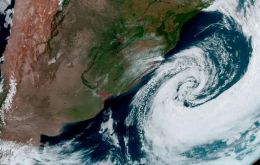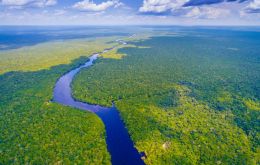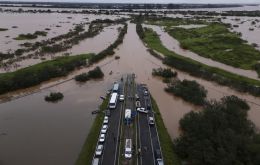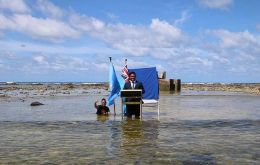MercoPress. South Atlantic News Agency
Tag: Climate change
-
Thursday, February 12th 2026 - 23:45 UTC
Trump moves to scrap EPA climate finding and unwind federal vehicle emissions rules

U.S. President Donald Trump said on Thursday his administration has withdrawn the Environmental Protection Agency’s 2009 “endangerment finding,” a determination that has long provided the legal foundation for regulating greenhouse gases under the Clean Air Act. The White House and the EPA framed the move as a major shift in federal climate policy and a broad deregulatory push affecting the auto sector.
Add your comment! -
Tuesday, February 10th 2026 - 04:06 UTC
January ranks as fifth warmest globally despite severe cold spells, Copernicus says

Last month was the world’s fifth-warmest January on record, the EU’s Copernicus Climate Change Service (C3S) reported, even as sharp cold spells hit large parts of the Northern Hemisphere in the second half of the month. Global mean surface air temperature reached 12.95°C, 0.51°C above the 1991–2020 January average and 1.47°C above the estimated 1850–1900 “pre-industrial” baseline used for climate comparisons.
-
Tuesday, January 27th 2026 - 10:38 UTC
Falklands’ expert participates in program on food security and climate change

Falkland Islands Government Department of Agriculture Agricultural Advisor and Chair of the Beef Suppliers Working Group, Olivia Woodiwiss, represented the Falkland Islands at the Green Overseas Program “Strengthening Food Systems Resilient to Climate Change” workshop in Tahiti, last December where she spoke on beef supply chain challenges, stakeholder coordination, and adapting agriculture to climate change alongside counterparts from 15 Overseas Countries and Territories.
-
Thursday, November 13th 2025 - 10:55 UTC
After violent storms, Brazil faces ongoing cyclone threat — severe weather also forecast in Argentina

Following a powerful extratropical cyclone that swept across south-central Brazil last week —bringing heavy storms and a tornado that devastated parts of Paraná and Santa Catarina— meteorologists are warning that the country faces a continued risk of similar weather events through the end of the year.
-
Tuesday, November 11th 2025 - 10:59 UTC
COP30 starts in Belem with a focus on accelerated global warming

The 30th Conference of the Parties (COP30) to the United Nations Framework Convention on Climate Change officially kicked off in the city of Belém (Brazil), marking the first time the global climate summit has been held in the heart of the Amazon rainforest. The meeting, set to run for two weeks, brings together world leaders from 163 countries to address the urgent crisis of global warming.
-
Thursday, August 28th 2025 - 10:10 UTC
Brazilian and French scientists tackle climate change in Amazon

Researchers from France and Brazil are meeting this week in Belém, in the State of Pará, to launch a new season of the Amazon Connections Seminar addressing the planet’s future from scientific, cultural, and political perspectives. The gathering will span until Aug. 29 at the Emílio Goeldi Museum in Belém, the host city of COP30, as part of the bilateral agenda held each year in two seasons—one in each country.
-
Monday, August 18th 2025 - 09:31 UTC
Al Gore says Washington has “schizophrenic” approach to climate change

During his recent trip to Brazil, former US Vice President Al Gore said that his country's stance on the climate crisis was “schizophrenic,” changing from one view to another, depending on who ruled. In his first term in office, between 2017 and 2021, Donald Trump withdrew the US from the Paris Agreement, whose main objective is to limit global warming to 1.5°C. But then came Joseph Biden, and the country returned to the agreement, only to pull out yet again with Trump's second term.
-
Monday, August 18th 2025 - 08:30 UTC
Bad weather expected in southern Brazil, Uruguay, and Argentina

Weather forecasters in southern Brazil, Uruguay, and Argentina foresee stormy conditions early this week due to an extratropical cyclone expected to bring severe havoc to the region.
-
Friday, August 8th 2025 - 09:20 UTC
Deforestation drops in Cerrado but grows in Amazon

Over the past 12 months, deforestation in Brazil’s Cerrado biome dropped by 20%, while the Amazon saw a 4% rise in alerts. In the Amazon, alerts covered 4,495 square kilometers—up from 4,321 km² in the previous period. Despite the uptick, this figure represents the second-lowest level recorded in the historical data series.
-
Sunday, July 6th 2025 - 11:58 UTC
Today Tuvalu’s Climate change visas; tomorrow extensive to the World’s?

By Gwynne Dyer - Some big changes arrive with a bang, but usually they sort of sneak in and you barely notice them at first. Last week’s big change saw the creation of the world’s first climate-change visas. It’s a way of giving potential climate refugees some hope and some dignity, and it would certainly be an improvement on the current migration mess.
